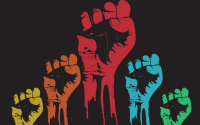December 14 2010
Despite being granted bail, WikiLeaks founder and editor Julian Assange remains imprisoned in London, awaiting extradition proceedings to answer a prosecutor’s questions in Sweden. He hasn’t been formally charged with any crime. His lawyers have heard that a grand jury in the United States has been secretly empaneled, and that a U.S. federal indictment is most likely forthcoming.
Politicians and commentators, meanwhile, have been repeatedly calling for Assange to be killed.
Take Democratic strategist and commentator Bob Beckel, who said on a Fox Business show: “We’ve got special ops forces. A dead man can’t leak stuff. ... This guy’s a traitor, he’s treasonous, and he has broken every law of the United States. And I’m not for the death penalty, so ... there’s only one way to do it: illegally shoot the son of a bitch.” U.S. Rep. Peter King, R-N.Y., called WikiLeaks a “foreign terrorist organization” and said that the website “posed a clear and present danger to the national security of the United States.” He went on: “This is worse even than a physical attack on Americans; it’s worse than a military attack.”
One of Assange’s lawyers in London, Jennifer Robinson, told me, in response to the flood of threats: “Obviously we take these sorts of very public pronouncements incredibly seriously. And people making these statements ought to be reported to the police for incitement to violence.”
One of Beckel’s co-panelists on Fox said what needed to be done was to “cut the head off the snake,” a phrase which, ironically, gained more significance when it appeared days later in one of the leaked cables. In the cable, Saudi Ambassador to the U.S. Adel al-Jubeir “recalled the King’s frequent exhortations to the U.S. to attack Iran and so put an end to its nuclear weapons program. ‘He told you to cut off the head of the snake.’ ”
Assange has found support in some surprising quarters. Conservative Harvard Law professor Jack Goldsmith blogged: “I find myself agreeing with those who think Assange is being unduly vilified ... it is not obvious what law he has violated. ... I do not understand why so much ire is directed at Assange and so little at The New York Times.” (WikiLeaks has partnered with several news organizations, including The New York Times, in its document releases.)
Col. Lawrence Wilkerson, the former chief of staff of Secretary of State Colin Powell, joined a group of former government officials in a letter of support for Assange, writing, “WikiLeaks has teased the genie of transparency out of a very opaque bottle, and powerful forces in America, who thrive on secrecy, are trying desperately to stuff the genie back in.”
Likewise from a feminist group in Britain. Since the principal, public reason for Assange’s arrest relates to questions about potential sexual crimes in Sweden, Katrin Axelsson, from the group Women Against Rape, wrote in a letter to the British newspaper The Guardian: “Many women in both Sweden and Britain will wonder at the unusual zeal with which Julian Assange is being pursued for rape allegations. .... Women don’t take kindly to our demand for safety being misused, while rape continues to be neglected at best or protected at worst.”
Assange, in an Op-Ed piece published in The Australian newspaper shortly after his arrest, wrote there is a chorus in the U.S. State Department of “‘You’ll risk lives! National Security! You’ll endanger troops!’ by releasing information, and ‘then they say there is nothing of importance in what WikiLeaks publishes. It can’t be both.’ ”
In a statement released to Australian television, Assange said: “My convictions are unfaltering. I remain true to the ideals I have expressed. ... If anything, this process has increased my determination that they are true and correct.”
Extradition proceedings are complex, lengthy affairs. WikiLeaks, for that matter, is not just Julian Assange, but a geographically distributed network of people and servers, and it has promised that the work of facilitating the release of documents from governments and corporations will continue. The U.S. Justice Department, if it pursues a case, will have to answer the question: If WikiLeaks is a criminal organization, what of its media partners, like The New York Times?






